Smetana Walter Goehr Londoner Symphonie Orchester - Die Moldau
Table of Contents
Download
Filename: smetana-walter-goehr-londoner-symphonie-orchester-die-moldau.rar- MP3 size: 10.4 mb
- FLAC size: 121 mb
Tracks
| Track | Duration | Preview |
|---|---|---|
| The Moldau (Beginning) | ||
| The Moldau (Conclusion) |
Video
The moldau
Images
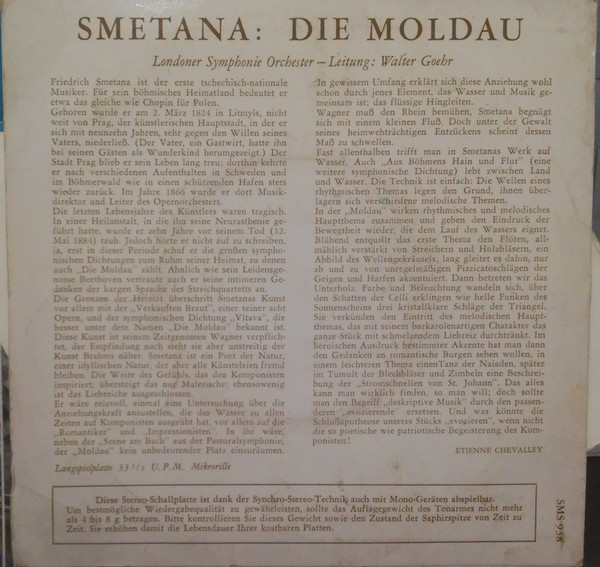
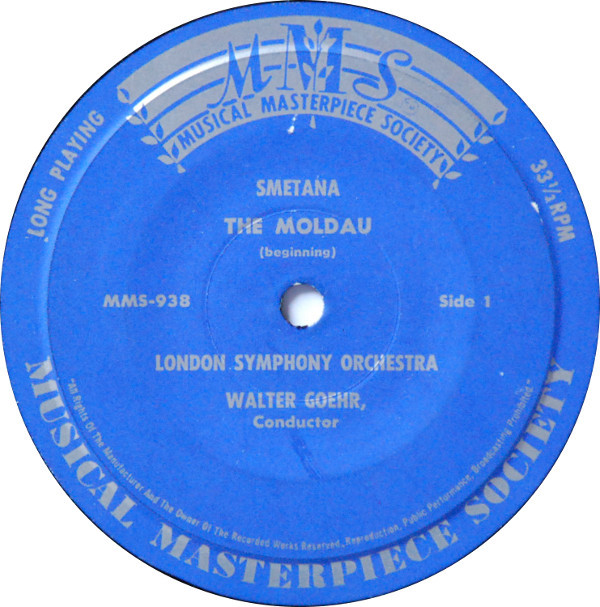
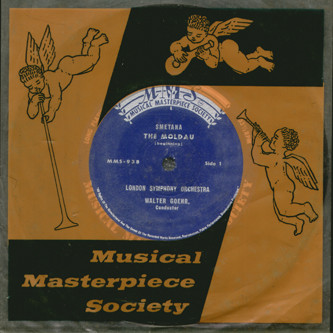
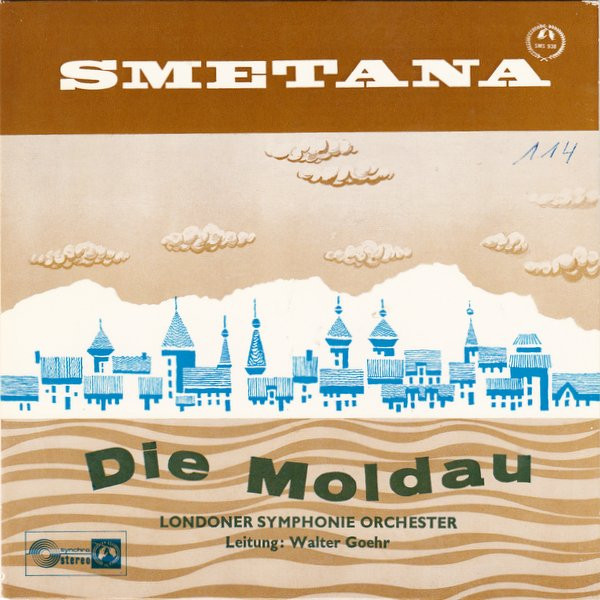
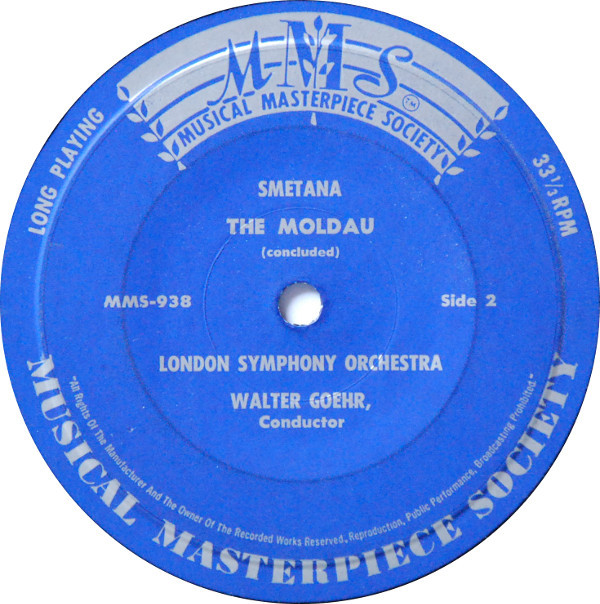
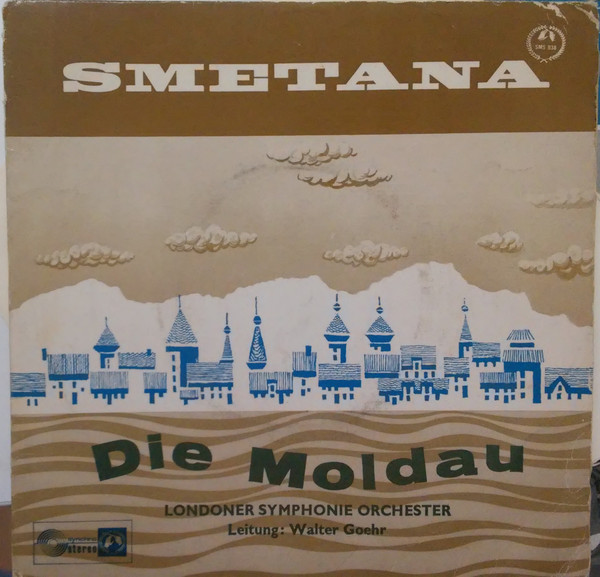
Catalog Numbers
- SMS-938, SMS 938
- MMS-938
Labels
- Concert Hall
- Musical Masterpiece Society
Listen online
- escuchar en línea
- écouter en ligne
- lyssna på nätet
- lytte på nettet
- online luisteren
- ascolta in linea
- kuunnella verkossa
- online anhören
- ouvir online
Formats
- Vinyl
- 7"
- 33 ⅓ RPM
- EP
Credits
| Role | Credit |
|---|---|
| Composed By | Bedřich Smetana |
| Conductor | Walter Goehr |
| Liner Notes | Etienne Chevalley |
| Orchestra | London Symphony Orchestra |
Notes
- Long Playing
- German sleeve with European labels (same as the Dutch release)
- Like Smetana* / Walter Goehr / Londoner Symphonie Orchester* - Die Moldau but different labels.
- London Symphony Orchestra in labels.
Barcodes
- Matrix / Runout (Runout Side A): SMS 938 1P 22 119
- Matrix / Runout (Runout Side B): SMS 938 2P 22 114
- Other: P
- Matrix / Runout (Side A): MMS938 PTI-ITU
- Matrix / Runout (Side B): MMS938 PT2-I TU
- Matrix / Runout (Side A, runout, etched): SMS 938 - I/ 23 TU
- Matrix / Runout (Side B, runout, etched): SMS 938 - II 23 TU
About Smetana Walter Goehr Londoner Symphonie Orchester
Bedřich Smetana (pronounced ; 2 March 1824 - 12 May 1884) was a Czech composer. He is best known for his symphonic poem Vltava (better known as The Moldau), the second in a cycle of six which he entitled Má vlast (My Country), and for his opera Prodaná nevěsta (The Bartered Bride).
Smetana was the son of a brewer in Litomyšl in Bohemia, then part of the Austrian Empire. He studied piano and violin from an early age, and played in an amateur string quartet with other members of his family. Smetana attended a high school in Pilsen from 1840-1843. He studied music in Prague, despite initial resistance from his father. He secured a post as music master to a noble family, and in 1848 received funds from Franz Liszt to establish his own music school.
September 1855 marked the death of his second child, his beloved four-year-old daughter Bedřiška. When his third child died nine months later, he committed himself to composition, producing the Piano Trio in G minor. This piece is full of sadness and despair, making use of phrases that are cut short, possibly in resemblance to his daughter's own life.
In 1856, Smetana moved to Gothenburg, Sweden, where he taught, conducted and gave chamber music recitals. In 1863, back in Prague, he opened a new school of music dedicated to promoting specifically Czech music. By 1874 he had become deaf from syphilis, but he continued to compose; Má vlast was written after his deafness had developed. Smetana also suffered from tinnitus, which caused him to hear a continuous, maddening high note which he described as the "shrill whistle of a first inversion chord of A-flat in the highest register of the piccolo".
From 1875 he lived in small village of Jabkenice.
His string quartet in E minor, Z mého života (From My Life, composed in 1876), the first of only two quartets, is an autobiographical work. The final movement is punctuated by a piercing high E in the first violin which, Smetana explained, represents the devastating effects of his tinnitus. He may also be hinting at this personal misfortune with the piccolo scoring in Má vlast. In 1883 Smetana, due to further progressive neurological effects of his illness, became insane, and was taken to a mental hospital in Prague, where he died the following year. He is interred in the Vyšehrad cemetery in Prague.
Smetana was the first composer to write music that was specifically Czech in character. Many of his operas are based on Czech themes and myths, the best known being the comedy The Bartered Bride (1866). He used many Czech dance rhythms and his melodies sometimes resemble folk songs. He was a great influence on Antonín Dvořák, who similarly used Czech themes in his works.
Real Name
- Bedřich Smetana
Name Vars
- B. Smentana
- B. Smetana
- B.Smetana
- BeDRich Smetana
- Bed Ich Smetana
- Bed_ich Smetana
- Bederich Smetana
- Bedric Smetana
- Bedrich (Friedrich) Smetana
- Bedrich Friedrich Smetana
- Bedrich Smaetana
- Bedrich Smetana
- Bedričs Smetana
- Bedrych Smetana
- Bedrích Smetana
- Bedřich (Friedrich) Smetana
- Bedřicha Smetany
- Bedřih Smetana
- Bedřích Smetana
- Bedžih Smetana
- Beidrich Smetana
- Biedrich Smetana
- Brederich Smetana
- Bredrich Smetana
- E. Smetana
- F. Smetana
- Federico Smetana
- Fr. Smetana
- Frederick Smetana
- Freidrich Smetana
- Friederich Smetana
- Friedr. Smetana
- Friedrich (Bedrich) Smetana
- Friedrich Semetana
- Friedrich Smenana
- Friedrich Smetana
- Friedrich Smetanna
- Friedrich Smétana
- Friedrich V. Smetana
- Friedrich Von Smetana
- Friedrich smetana
- Friedrich v. Smetana
- Friedrick Smetana
- Friedřich Smetana
- Frirdrich Smetana
- Frédéric Smetana
- P.D.
- Smentana
- Smetana
- Smetana B.
- Smetana Bedrich
- Smetana Bedrich Friedrich
- Smetana Friedrich
- Smetana, Bedrich
- Smetana, F.
- Smetany
- Smetena
- Smethana
- Smettana
- Sumetana
- Trio en G minor op.15
- Σμέτανα
- Б, Сметана
- Б. Сметана
- Б.Сметана
- Бедржих Сметана
- Берджих Сметана
- Беџих Сметана
- Сметана
- Сметаны
- ¹á¿Ê
- ÙɸÕû¹á¿Ê
Comments
Can you upload the rest of this fine recording?
